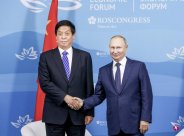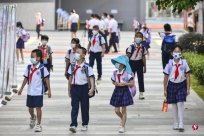U.S. media reports that after upgrading the production line, Tesla Shanghai's "Super Factory" in August has increased significantly, but in this world's largest automotive market, Tesla's performance still lags behind its national local competitors BYDEssence
According to the data released by the China Federation of Federation on Thursday (September 8), the Tesla China Factory delivered nearly 77,000 cars last month, which was nearly three times in July, an increase of 74% year -on -year increased by 74% year -on -yearEssenceThe Federation of Federation said that the exports exceeded 42,000 vehicles.The Tesla Chinese factory mainly produces Model Y and Model 3.
According to the Wall Street Journal, Tesla occupied about 12%in the Chinese new energy vehicle wholesale market in August, second only to the share of 16%of BYD pure electric vehicles.The U.S. giant has dominated in the Chinese new energy vehicle market, but is overtaken by BYD, headquartered in Shenzhen.BYD was invested by Buffett and produced a number of popular electric vehicles and plug -in hybrid vehicles.
Due to the previous epidemic control of Shanghai, Tesla lost huge output in April.Nevertheless, Tesla once again stopped the production of the Shanghai plant in July to upgrade the production line for several days, the purpose is to increase the output and make up for the impact of production.Tesla said in July this year that after the upgrade, the factory can produce more than 750,000 cars each year.
The last record set by the Tesla Shanghai plant was 79,000 units delivered in June.In the first quarter of this year, before the most serious interference due to the Chinese epidemic in April, the factory delivered an average of about 61,000 vehicles per month.
According to the official website of Tesla China, the company has recently shortened the delivery time of Chinese consumers, and the longest waiting time is shortened to 14 weeks.
The Chinese passenger car market has maintained a growth. Retail in August was 1.87 million, a year -on -year increase of 29%, an increase of 3%from July.
More than 30%of all cars produced in China are electric vehicles or plug -in hybrid vehicles.
Cui Dongshu, Secretary -General of the China Federation of China, said that although the overall sales and production level showed a strong market, the car output in August was lower than July, which is very unusual.
Manufacturers usually produce more cars in August to meet the growth of autumn.This year, some production capacity was severely disturbed due to the prevention and control of the epidemic and high temperature weather in the region.
BYD continued the rapid momentum in the market. Last month, it broke its own sales and production records, and threw other car manufacturers in the back.
The Wall Street Journal reported that according to a announcement, the company sold nearly 83,000 pure electric vehicles and 92,000 plug -in hybrid vehicles in August, selling 175,000 vehicles in total.Plug -in hybrid vehicles have a small battery and a internal combustion engine, which is considered a new energy vehicle.New energy vehicles can enjoy tax reduction and subsidies in most places.
Although sales and income have grown rapidly, BYD's stock price has fallen 18%since Thursday (1st).The previous stock market announcement showed that the company's most well -known supporter Buffett's investment company Berkshire Hathaway has reduced its holdings of BYD Hong Kong listing stocks since last year.
BYD also signed an agreement with Thai industrial real estate developer WHA Group to establish an electric vehicle factory on Luo Yong on the east coast of Thailand.According to a statement of WHA Group, this new plant is expected to deliver 150,000 electric passenger cars in 2024.BYD currently has a manufacturing base in China and has a passenger car factory in California.
In August, China's independent brand car sales were 850,000, a year -on -year increase of 41%; mainstream joint venture brand car sales were 770,000, an increase of 18%year -on -year.
Due to the shortage of power in Sichuan Province in southwestern China, several joint venture automakers, including Volkswagen and Toyota Motor Corporation, are disturbed.Sichuan Province has recently encountered 60 rare high -temperature drought disasters, leading to a shortage of power.
Toyota Motor and China First Automobile Group Corporation's joint venture in Chengdu, the capital of Sichuan Province, stopped working for a week last month.However, in addition to the vehicles produced by other factories in the joint venture, FAW Toyota's sales in August still reached 81,400 units, an increase of 7%over the previous month.The company's spokesman said in late August that Chengdu's joint venture factory used an internal generator to keep the assembly of the assembly running at a lower level.
The Federation of Federation said last week that the impact of power restrictions was limited and temporarily.After the rainfall and the temperature decreased in the area, the car assembly plant and component manufacturers have been able to restore normal operations.
Due to the epidemic relationship, the residents of Chengdu in principle at home began on Thursday. Toyota said that its Chengdu plant was operating normally. In accordance with the requirements of the Sichuan Provincial Government, the factory implemented a "closed -loop" management of workers.Volkswagen's spokesman fingered on Thursday that their factories in Chengdu are also operating with similar arrangements.
China recently announced that incentive measures such as new energy vehicle exemption vehicle purchase tax have been extended to the end of next year to deal with the great slowdown in the economy of suppressing consumer demand.



